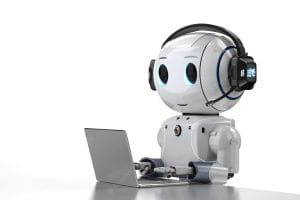Thinking About Working: Issue 3
Written by Noah Leavitt, Director of the Career and Community Engagement Center
Will AI Take Your Job?
Continuing our investigation into the ways that rapidly evolving technologies are changing the world of work, today I want to explore the question of whether Artificial Intelligence might take your job (this line of thinking is inspired by Associate Professor and Microsoft Chair of Computer Science Janet Davis’ provocative Commencement address, “Will AI Write Your Thesis?”).
When people think about technology and work, they often first think about robot machines taking jobs, which is in fact happening. However, today I want to focus on AI, which may or may not be powering robots but can operate as an independent force. (Robot machines doing human labor is a fascinating topic perhaps for a later edition of Thinking About Working and raises all kinds of tough questions, including human resources worries as well as legal liability. Many thanks to Yesenia Jose ’23 for raising this point).
Clearly, AI– the rapid and wide-ranging ability of computers to use pattern recognition to complete tasks– is affecting work in extraordinary ways. Not just specific jobs but whole industries and sectors are being reshaped and rebuilt with technologies doing labor that human beings have historically carried out.
This summer, “Built In” magazine published a compelling overview of how this is playing out, noting:
“The consensus among many experts is that a number of professions will be totally automated in the next five to 10 years. A group of senior-level tech executives who comprise the Forbes Technology Council named 13, including insurance underwriting, warehouse and manufacturing jobs, customer service, research and data entry, long haul trucking and a somewhat disconcertingly broad category titled ‘Any Tasks That Can Be Learned….’” [italics added]
Need a procrastination outlet? The site willrobotstakemyjob.com calculates the “risk of automation” for hundreds of sectors and position types.
The worry that algorithms can and will consume whole industries and fields of professional practice raises bleak possibilities. Will any roles be safe? Will work– of any kind– even be an option for me in the coming years if the role that I’ve dreamed of since childhood is now going to be able to be carried out by a thumb drive?
There’s been so much exploration of this topic over the past few years that an entire field of new lists has emerged discussing jobs that can’t be– at least in the near future– automated. (Myriad stories like these can be found… thanks to search algorithms: “Ten jobs that are safe from robots,“ “Will DALL-E the AI Artist Take My Job?” and “12 jobs that robots (AI) will replace in the future, and 12 that won’t.”
The question of which jobs could be lost due to advances in AI work has significant and worrisome racially imbalanced implications. One recent analysis feared that African Americans could have a 10% greater likelihood of automation-based job loss than other workers. “Forbes” recently posited that workforce automation will continue to exacerbate the racial wealth gap.
If AI is not only writing our thesis but potentially edging us out in the application line, especially in discriminatory ways, is there any hope?
In his excellent 2020 work, Human Work in the Age of Smart Machines, author Jamie Merisotis argues that the capabilities of thinking critically, reasoning ethically, interacting interpersonally, and serving others with empathy will be what separates human work from AI or technology-driven work.
As part of our ongoing effort to learn from the best thinkers and commentators about how work is changing, in December 2020 the team in the then-Student Engagement Center (now the CCEC) spent an hour with Jamie Merisotis exploring how we could best support and advise students to adjust to this new world of work. Merisotis is an international leader in higher education, human work, philanthropy, and public policy, and president and CEO of the Lumina Foundation since 2008. We build his suggestions into our initiatives, including in our planning for the four-year career coaching initiative that we launched the following semester.
Occasionally students ask their career advisor about whether the job they have always wanted to do after graduation is going to become extinct, and if so, whether they have other options. But in general, we notice that most Whitman students recognize that the education they are receiving is going to allow them to be engaged in the world, and the world of work, in ways that will be meaningful.
In 2018, historian Yuval Noah Harari published “21 Lessons for the 21st Century.” Harari was concerned about how education systems need to be adjusting to the changing world. He said:
“So what should we be teaching? Many pedagogical experts argue that schools should be switching to teaching ‘the four Cs’ – critical thinking, communication, collaboration, and creativity. More broadly, they believe, schools should downplay technical skills and emphasize general-purpose life skills. Most important of all will be the ability to deal with change, learn new things, and preserve your mental balance in unfamiliar situations. In order to keep up with the world of 2050, you will need merely to invent new ideas and products but above all to reinvent yourself again and again.” (268).
Harari is reinforcing the potential of a broad liberal education to allow people to continue to both stay ahead of and also work alongside AI’s algorithms. So, while not everything is going to be smooth sailing, Whitman students are fortunate to be getting a broad education that prioritizes these exact skills, habits, and inclinations.
Students, as we close out this reflection, I encourage you to raise this topic with your CCEC career coach, with your faculty, with alumni and mentors, and with each other. The more we understand how technology is influencing how work is done, the more we can understand what uniquely human skills and attributes we can bring to the world.
